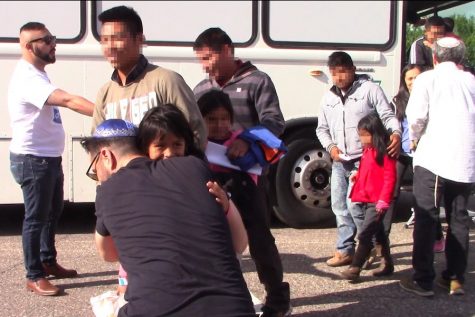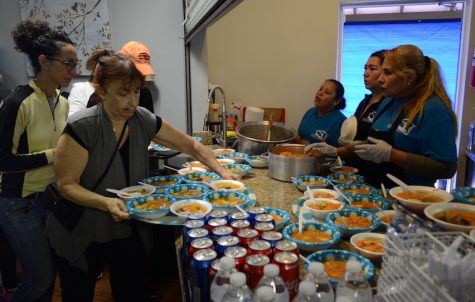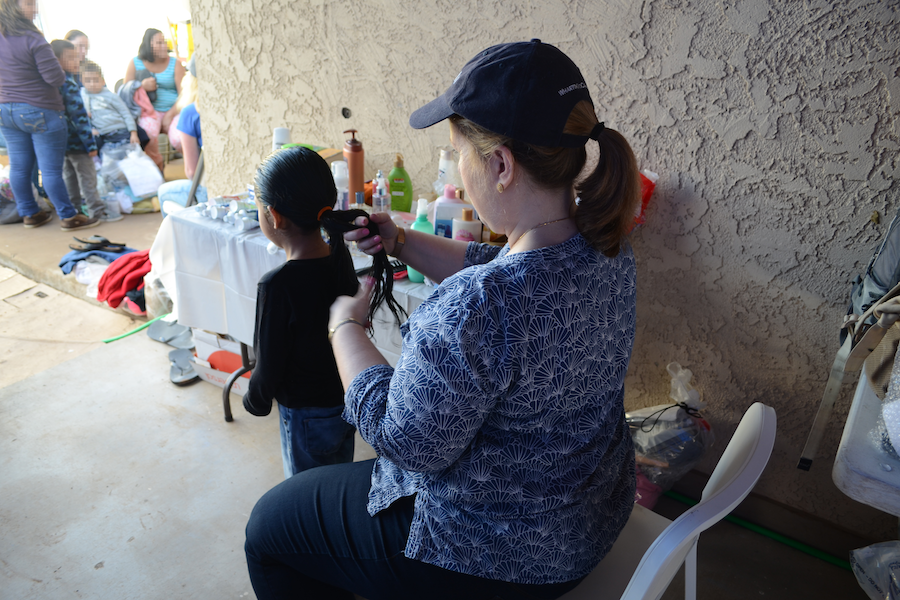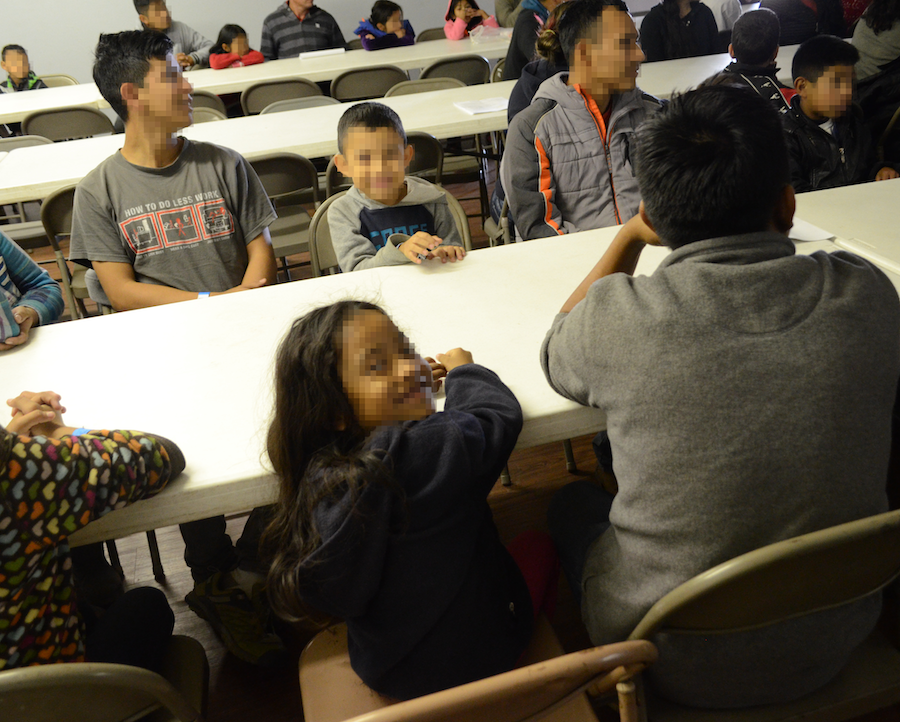Welcoming the stranger with hot food, scissors and applause
B’nai David volunteers travel to Phoenix to greet two busloads of asylum seekers on ‘family parole’
March 6, 2019
It was almost noon when two Department of Homeland Security buses finally turned into a church parking lot in northern Phoenix. Volunteers who had been there since around 9 a.m. were lined up and waiting to welcome the travelers into America.
The first family to emerge — a mother holding on to her two children — stepped off the bus, and the volunteers broke into applause, which continued on and off as the rest of arrivees gradually disembarked.
About 30 would-be immigrant families, most from Guatemala, were being dropped off by Immigration Customs and Enforcement (ICE) after being cleared for release into the United States to await asylum hearings.
“Bienvenidos!” — welcome! — the volunteers cheered as they shook hands with the parents and children, some of them squinting in the midday sun The mothers and fathers walked along the line of volunteers and smiled back, immigration papers and children in hand.
This scene has replayed itself almost every day over the past five months at the Casa de Oracion No. 2 church, but Jan. 16 was different: among the those waiting welcome the migrants were 12 volunteers from B’nai David-Judea Congregation on Pico Boulevard in Los Angeles, who had taken a 5:15 A.M. flight from LAX to be there.
They were led by the rabbi of the synagogue, Rabbi Yosef Kanefsky, who had announced the trip to Phoenix to his synagogue congregation on Shabbat as well as in an email, calling for volunteers to help out the arriving families.
Earlier that day, Rabbi Kanefsky told the group to remember the famous words of Rabbi Akiva, who said that the most important precept of Judaism is to love others as yourself.
“The key word is as ‘yourself,’ in that we have to see, and we do see, all others as being no more and no less than ourselves,” said Rabbi Kanefsky, father of Shalhevet senior Yakir Kanefsky. “May God see our efforts and bless the work of our hands.”
The group from B’nai David had arrived in Phoenix at around 7:15 A.M. local time and driven to Valley Beit Midrash, a Jewish educational organization nearby, where they were met by Rabbi Shmuly Yanklowitz, VBM’s president and dean, who has been leading the effort locally through a group he founded called Arizona Jews for Justice (AJJ). AJJ has been helping churches with dropped-off arrivees since December.
Rabbi Yanklowitz, who is also a former Shalhevet teacher, met the group in a small side room on the VBM campus, where he led a brief Torah discussion. Jews, he said, could relate to the feelings of asylum seekers, who are strangers in a foreign land as the Israelites were in Egypt.
Then he introduced campaign organizer Eddie Chavez, who explained the immigration and detention process. Those brought to Phoenix, he said, had been judged to possibly have a legitimate asylum claim and were cleared to stay with family while awaiting a hearing — a status he called “family parole.”
He predicted that many of the arrivees would be sick and would not have showered in days or weeks.
“We’re gonna form kind of a welcome tunnel of people…where the first thing they should see is a smiling face and a hello,” he said. “We would like for everybody to just extend your hand, say hello.”
Sometimes hundreds of asylum seekers are dropped off in a single day, so local churches have been coordinating with ICE to welcome them before sending them off to their families. How long it will be until their court appearance — at which they will try to prove that they’re in danger back at home because of what they believe or who they are — is unknown.
If the churches didn’t take them in, he said, ICE would “drop them off in the street.”
And despite a new immigration policy announced by Homeland Security Dec. 20 under which migrants requesting asylum would be sent to Mexico to await their court hearings, Mr. Chavez confirmed last week that as of Feb. 25, the churches were still greeting more than 100 each day.
“It’s not gonna stop,” he said.
The volunteers then left with Mr. Chavez for the church, carrying suitcases filled with food, medicine, clothes and other donations brought from Los Angeles. Once there they began by unloading the donations into a shed.
The church kitchen was already host to a bustling scene, with church volunteers preparing hot food, setting up hair-washing stations or organizing donated clothes.
Then the work stopped, and all of the volunteers joined hands in a circle on a large expanse of grass outside the church. Rabbi Kanefsky began to speak, and Mr. Chavez translated for the church volunteers who spoke Spanish.
“We are about to be a part of something that we’ve never been a part of before,” Rabbi Kanefsky said. “And no matter what happens…the only thing that we need to remember is the principle of the great teacher Rabbi Akiva: you shall love others as you love yourself.”
Reflecting later that day on what he had said, Rabbi Kanefsky added a thought from Shimon Ben Azzai, a Talmudic scholar of the early second century C.E.
Sometimes people are so different from us that “they don’t fall into the category of kamocha” — as yourself — he said. When that happens, “Ben Azzai says the bigger principle is that God created human beings with tzelem Elokim” — in God’s image.
“You have something fundamental and foundational that you share with every other human being…and that is, you are both created by God, in His image. And that carries with it all kinds of responsibilities and obligations.”
At around 11:45, two white buses, each about 40 feet long with their windows covered, slowly pulled into the parking lot. Mr. Chavez organized the volunteers into a line stretching from the dining hall.

WELCOME: A young girl from Central America is welcomed by Shalhevet parent Mordechai Fishman after she stepped off the bus in Phoenix.
Some started unloading the travelers’ belongings — backpacks and plastic sacks provided by Homeland Security — from the bottom of the buses. ICE agents stepped out of the buses and me with Mr. Chavez and the church’s leader, Pastor Ramon Madrid.
A few minutes later, the arrivees began to file out of the bus. About 75 people were released in all, all welcomed with rounds of applause and smiling faces.
The families followed the line of volunteer greeters into the dining hall where they took seats along four tables. Pastor Madrid welcomed them with a few jokes and explained the logistics related to their departure from the church to their host families, which the volunteers were ready to help them to do.
The pastor then asked everyone to stand up, and began a prayer. His guests stood with their heads bowed and eyes closed, some listening intently and others whispering personal prayers.
“God, we give you thanks this morning because you have permitted us to arrive well to this place,” Pastor Madrid said. “You have kept us. You have protected us. You have blessed us along the way. You have given us safe haven, my Lord.”
A mother held her hands to her face in tears while she listened. The volunteers handed out drinks, rice, and bowls of soup.
“Thank you for Your mercy…,” Pastor Madrid continued. “You protect us, Lord, and now you bring us food to eat….”
Pastor Madrid said Casa de Oracion No. 2 had taken in and sent out more than 5,000 people in the past five months.
As the newcomers ate, Spanish-speaking B’nai David volunteers Monica Sufar, Shanee B. Michaelson and Nikki Sieger spoke with them, collecting their names, ages, origin, destination, medical conditions and a phone number of whomever they were going to be staying with.
Other BDJ volunteers also went from table to table, cutting off the ID wristbands that had been given to them by ICE.
“One or two people wanted to keep it, but most of them looked like they were just happy to get rid of it,” said Jenny Gelb, one of the BDJ volunteers.
The new families were then sent one by one to a repurposed playroom for medical checkups. After being cleared by one of three volunteer examiners, they waited their turn to shower.
It took about four hours for all the travelers to be showered.
Shalhevet alumna Kayla Ablin ‘15 and her mother Lisa Ablin were among the group from B’nai David. Kayla spent most of her time combing and braiding the children’s hair and checking for lice.
She said the dirt and knots in their hair made it hard to check, but it was easier once they were cleaned and freshened up.
Many of the mothers wanted to comb their own daughters’ hair, “which is really nice,” said Kayla. “It’s definitely a sign of comfort for a mom to comb her daughter’s hair.”
Ms. Gelb and BDJ volunteer Hannah Wexler helped the women and girls shower.
“We were soaked, because we were helping the kids scrub their hair,” said Ms. Gelb, who is the mother of Shalhevet alumni Amanda ’05 and Lexi Gelb ‘10.
She said some of the children didn’t know what to do.
“They just stood under the shower, like literally just stood,” she said. “They didn’t know how to use the soap and soap themselves down.”
Others had trouble undressing because of the ankle tracking bracelets that ICE fitted on them to make sure they’d show up for their asylum hearing. Ms. Gelb used scissors.

FOOD: Hana Wexler and Dorit Naftalin Nelson, mother of Shalhevet students Ami and Noa Nelson, collect trays of soup to serve to the migrants.
“They couldn’t pull their jeans off to get in the shower because it got caught in the ankle bracelet,” Ms. Gelb said. “So we just had to make a slit of maybe two or three inches at the bottom of the ankle of the jean so that it could go over the ankle bracelet.”
The jeans and the rest of the migrants’ clothes were then thrown out because they were in such poor condition, she said. The newcomers were given fresh clothes that had been donated.
They were also given new footwear.
“Each person was given a pair of open sandals in case they had sores on their feet — they didn’t want them to wear socks and shoes,” Ms. Gelb said. “Their feet needed to breathe in case they had some blisters or some kind of sores.”
Pastor Madrid tried calling their’ families and arranging travel — by bus, train, or plane. Those whose families were unavailable or who could not afford to buy tickets for them would sleep on mattresses provided by the church. If they did not have a place to go within two days, they would be sent to foster homes.
As they waited, parents sat on the grass watching their children play. BDJ volunteers made trips to Costco to buy clothing and other needed supplies, including cold-cuts and sandwich materials to send them off with. They also bought packs of shoelaces.
As the day went on, more and more families were sent off and the church slowly emptied.
At 4:20 p.m., the group from B’nai David left with Mr. Chavez for a nearby kosher restaurant to draw their day in Phoenix to a close.
It was a very intense experience,” said Ms. Michaelson, one of the Spanish-speaking B’nai David volunteers, looking back on the trip a few days later.
“You don’t often have the opportunity to meet these people face to face.”
She said she was inspired to join the trip by Rabbi Abraham Joshua Heschel, who wrote about community service and chesed, the hebrew word for “acts of kindness.”
Kayla Ablin said she grew up volunteering and joining this trip was natural.
“My entire upbringing,” Kayla said, “especially at B’nai David, has been around tikkun olam,” the Hebrew phase which means to repair the world.
“My family always does every opportunity to feed the homeless,” she said. “I was brought up that way… I was involved in a lot of chesed in Shalhevet, that was like the one thing I did in high school.”
BDJ volunteer Monica Sufar said it was surprising to see the asylum seekers smiling after the hardships they’d experienced.
“Even though they were coming from where they were coming, they were smiling and they were being very responsive to us,” said Ms. Sufar.
Not all the Jewish volunteers were from Los Angeles. Nancy Greenberg and her husband, Jerry, had been helping out in the church with AJJ since the arrivals started.
“As Jews, we’re commanded to take care of the orphan and the strangers,” Mrs. Greenberg said, “because we were all strangers.”
The strangers who arrived in northern Phoenix that suggested the goal had been met — at least for that day.
Elmi, 14, spoke to The Boiling Point a few hours after arriving with her father and older sister at the church. She said the journey to the U.S. border was tiring and cold, and the worst part was being intercepted by ICE.
But arriving at the church made up for it.
“The way we were received here was the best part,” Elmi said. “I was happy.
“It was a blessing to know that God placed all these people here to help us, that He has continued to help us and I ask God that he keep sending blessings like this. I feel very blessed.”
This story won the Simon J. Rockower Awards 2020 First Place in Multimedia Reporting from the American Jewish Press Association, the CSPA 2019 Gold Circle Awards First Place in Sidebar Writing; First Place in News Reporting on Interreligious or Intercultural Events in JSPA’s 2020 Jewish Scholastic Journalism Awards; and First Place in Video Reporting in JSPA’s 2020 Jewish Scholastic Journalism Awards.
Get the latest from The Boiling Point. Sign up for our news feed.
Leaving lives behind, teens carry hope on trip to America
ICE had removed their shoelaces as a safety precaution, so their shoe tongues flapped open as they walked.
Instead of smartphones and airpods, they wore electronic tracking bracelets to make sure they wouldn’t miss their court dates and disappear illegally into the United States.
They spoke to the Boiling Point in Spanish, and their answers were translated into English by Shalhevet receptionist Daniella Silva. At the request of Arizona Jews for Justice, migrants’ last names have been omitted for their protection.
Edson, age 17
Wearing a grey-brown t-shirt and grey slacks, Edson Edson came off the bus with his mother, who was wearing an Aeropostale plaid zip-up jacket, immigration papers in hand. They both smiled brightly at the volunteers who welcomed them.
An only child, Edson had traveled for eight days from Guatemala, mainly on public buses. He described his journey as difficult, cold and tiring, and said he did not sleep much.
“The worst part was in the way we traveled,” Edson said. “There were a lot of dry, dusty roads. There were so many roads that we could not sleep.”
Once they reached the border, they were put in a detention center where they stayed for about two days.
“When we were taken by ICE,” Edson said, “they told us that we were not allowed to have shoelaces or belts. They told us to take off our laces and throw them away. They asked us to put all belts away in our backpacks.”
He is okay with this practice, as he understands it is done “as a precaution to avoid any incidents occurring or, anything negative happening, anything bad.”
Edson likes listening to “trap” music, a form of hip-hop with influences from dubstep and rap. His favorite singer is Kontra Marín, a Guatemalan 26-year-old rapper. He also plays sports and boxes.
Back at home, he went to school during the week and worked on Sundays. A serious student, his coursework included math, practical mathematics, biology, pedagogy, psychopedagogy, and physical education, he said. He had one year left to graduate when he left home.
None of his subjects were difficult for him, he said.
“They teach well,” Edson said of his teachers back home. “They don’t make things hard. You understand what they say, what they explain.”
On Sundays he worked many jobs.
“I was a driver, I drove — I also worked in the fields,” he said. “I cleaned houses. I painted houses…I also took care of pets. I would take them for their walks. I would wash them.”
He said that he left Guatemala because of safety, economic and educational factors.
“Over there, there is a lot of crime, a lot of delinquency,” he said, “There are no jobs. It is very dangerous. It is difficult to stay in school.”
He left his best friend, Dennis, behind in Guatemala. And when he got to Mexico, officials confiscated his smartphone.
“They told us that they did this so no one would extort us,” Edson said. “I deleted everything that was on the phone, and then I gave it to them. It was an Alcatel phone. It was small.”
Like many of the arrivees that day, Edson is an Evangelical Christian. He said religion “is a way of being fine with oneself. And it guides you down a good path.”
He said ICE agents were friendly to him.
“If you do not follow their instructions, then they do get angry,” he said. “But if you listen to them, if you follow their instructions, then they treat you well.
“It also depends on the people,” he added. “They do not treat everyone in the same manner.”
Agents did not tell the travelers that they were being released, so Edson didn’t know he where was going and he was surprised by the welcome.
He said that he and his mother were heading to Nashville, Tenn., to stay with a friend also from Guatemala. He said his goal is to finish high school and then work, doing “whatever I could find.”
Although other countries, like Costa Rica, Panama, and Mexico are closer to his hometown, he said in the U.S., “here one can find their opportunity. To study, to succeed.”
Elmi, Age 14
Wearing blue jeans and brown boots, Elmi stepped off the bus with her father and older sister. She came from Guatemala, and had traveled with them and about 20 others.
“It was very tiring,” Elmi said of her journey to the U.S. border. “It was cold throughout the whole ride. There was also not that much food.”
“The worst part was when we were picked up by immigration services,” she said. The ICE agents seemed angry, she said, “but they did not mistreat us.”
Elmi came from a small village and had to leave school at a young age and go to work.
“In the village there were not very many resources,” she said. “So, that obligated my sister and me to leave the village and find work in the city.
“But the work was hard and they treated us badly,” she continued. “We wanted to have a better life…. I heard that here there are better opportunities. People have more opportunities to overcome and succeed. We have seen people who come from the U.S. back home and God bless them, because we see how their lives have gotten better.”
She said that she plans to go to school to study and would also “like to find work here.”
Unlike Edson, she didn’t have to leave her best friend back at home; she brought her best friend with her: her sister.
“She’s my best friend, my best sister,” she said, laughing.
Elmi loves listening to Christian music; her favorite singers are Marcela Gándara and Mariolita Gonzalez. An Evangelical Christian, she has had a strong belief in God ever since her mother took her to church five years ago.
But she believes God loves members of other religions, too.
“I think God does not have exceptions for anyone,” she said of other religions. “God loves us all equally. Simply having a certain type of religion changes nothing.”
This story won First Prize in Sidebar Writing in the CSPA 2019 Gold Circle Awards.

